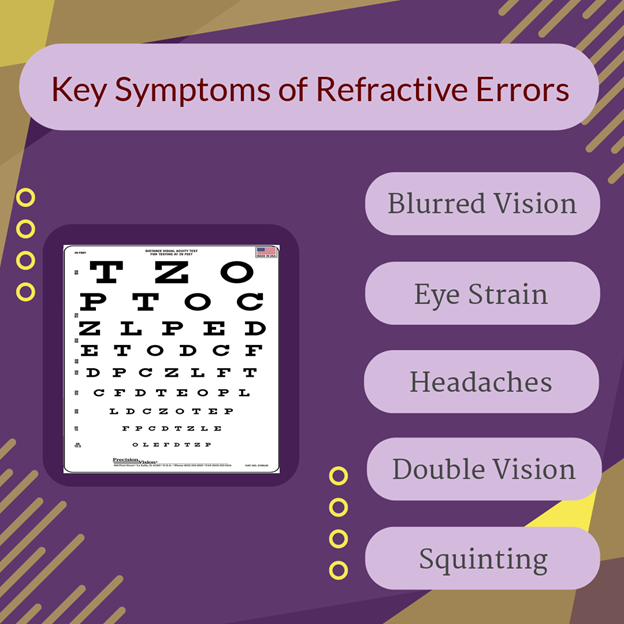Is your vision not as sharp as it used to be? You might be dealing with refractive errors. These vision problems are common, impacting people worldwide, including in India. Many people don’t even realize they have them. Ignoring the signs can lead to more serious vision issues. It’s crucial to be aware of and recognize the symptoms early. By doing so, you can seek treatment and maintain good eye health. Keep reading to learn more about symptoms to watch for, and how places like Mega Eye Care can help.
What Are Refractive Errors?
Refractive errors happen when the shape of your eye doesn’t bend light correctly. This causes blurred vision and can make everyday activities challenging.
The major types include:
- Myopia (nearsightedness): Difficulty seeing far away.
- Hyperopia (farsightedness): Difficulty seeing up close.
- Astigmatism: Vision is blurry at any distance.
- Presbyopia: Common with aging, making it hard to see things up close.
These errors can affect your quality of life by making it difficult to read, watch TV, or even drive safely. Identifying them early can help in managing your vision effectively.
Spotting the Symptoms: What Not to Overlook!
Are you often squinting? Do your eyes feel tired? Maybe you have frequent headaches? These are some common symptoms of refractive errors. Blurriness, eye strain, and trouble focusing could also indicate an issue. Ignoring these signs can lead to further complications, such as constant discomfort and reduced productivity. Timely attention to these symptoms can prevent deterioration and maintain overall eye health.
Why Routine Eye Check-ups Matter?
Regular eye exams are essential in detecting refractive errors early on. These check-ups ensure that any changes in your vision are caught quickly. Early diagnosis means you can take steps to correct your vision sooner rather than later. Professionals recommend visiting an eye specialist at least once a year. This helps safeguard your sight and prevents further complications down the road.
Busting Myths Around Refractive Errors
Many believe that wearing glasses can worsen vision, but that’s not true. Spectacles help you see better and don’t make your eyes weaker. Another misconception is that refractive errors are solely genetic. While genetics play a role, lifestyle choices also impact eye health. Ensuring a balance of both can aid in maintaining good vision. It’s vital to understand and dispel these myths for better eye care.
Lifestyle Habits and Eye Health
A modern lifestyle can strain your eyes. Spending hours in front of screens or reading in poor lighting can worsen refractive errors. Here are simple steps to improve eye health:
- Take regular screen breaks.
- Ensure adequate lighting when reading.
- Eat a balanced diet rich in vitamins A, C, and E.
By adopting these habits, you can protect your eyes and potentially improve your vision.
Advanced Treatments: Mega Eye Care Hospital Leads the Way
Mega Eye Care Hospital is at the forefront of treating refractive errors. They utilize advanced technologies like LASIK, which reshapes the cornea for clearer vision. Beyond technology, they offer personalized care plans, ensuring each patient receives tailored treatment. The hospital boasts numerous success stories, with many patients regaining improved sight and quality of life. Combining cutting-edge procedures with compassionate care, they provide a top-notch service that leads in eye healthcare.
Proactive Eye Care: What You Can Do Today
You don’t need to wait to start caring for your eyes. Here are some practical steps:
- Opt for regular eye check-ups.
- Follow a healthy diet rich in fruits and vegetables.
- Invest in proper eyewear with UV protection.
- Stay informed by consulting professionals.
Should you experience persistent symptoms, it’s time to seek professional help. Don’t wait for things to worsen. Stay proactive and prioritize your eye health today.

